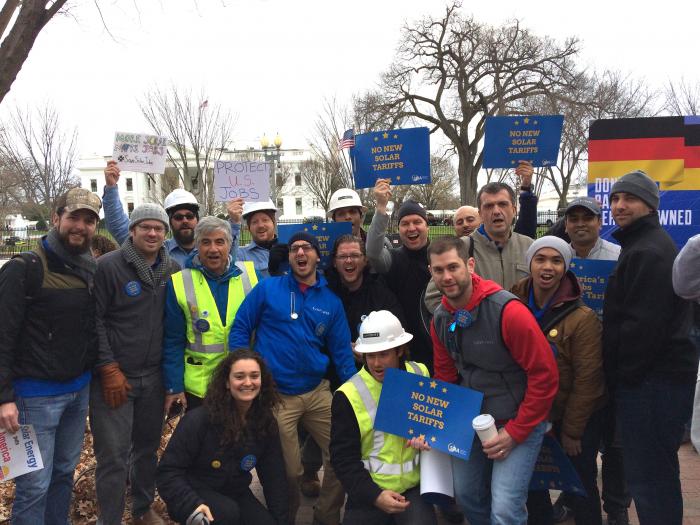
The following is the prepared testimony that SunPower CEO Tom Werner presented Wednesday during a public hearing held by the Office of the U.S. Trade Representative in Washington, D.C., regarding the Section 201 solar trade case.
Thank you for the opportunity to address you today.
I’m Tom Werner, President and CEO of SunPower Corporation. I am here today to convey three messages:
First: SunPower is the second largest American solar company and the largest affected by this safeguard action. We are both a job-creator and the world-leader in advanced solar technology. Yet, we would be disproportionately harmed by the tariffs and quotas some have proposed.
Second: Products based on SunPower’s patented Interdigitated Back Contact — or IBC technology — are fundamentally different than other solar products and should not be subject to the same safeguard measures.
Third: We support the sale of import licenses as the best means to help American companies compete.
To elaborate:
First, SunPower’s global headquarters is in the United States. We run our company from here, we develop our products here and the U.S. market is the heart of our business. SunPower directly employs more than 1,000 American workers in offices throughout the U.S.; and, in the last five years alone, we have paid more than $1 billion in U.S. wages. Our dealer partners support more than 12,000 additional American workers across 40 states; and, our supply-chain and construction partners employ another 4,500.
Moreover, we conduct our research and development in the U.S., our next-generation pilot-production lines are located in the U.S., and we’ve spent more than $200 million on domestic Research and Development in the last two years alone. By contrast, SolarWorld conducts its R&D in Germany.
In fact, the only American solar company larger than SunPower, or with a commitment to domestic R&D like ours, is First Solar. Products based on First Solar’s differentiated technology are excluded from this safeguard action. Products based on SunPower’s IBC technology should be excluded as well.
The tariffs and quotas proposed by the Petitioners and a few others would jeopardize the viability of our distinctly-American company and our technology. Such tariffs would force SunPower to pay duties that are significantly higher than those that Chinese companies would have to pay. As a result, SunPower and its network of dealers alone would likely be forced to eliminate more American jobs than their proposed measures would create.
Second, products based on SunPower’s unique copper-plated IBC technology are fundamentally different than other solar products and should be excluded from safeguard measures.
No one else can make our IBC products. Not the Petitioners and not the Chinese. Our one-of-a-kind products cost significantly more to manufacture, and they can only be produced in the factories that SunPower owns and controls. Factories that use customized equipment, materials and processes that we invented. Our products — the most efficient and the most reliable solar products available — are the result of more than 30 years of innovation and more than half a billion dollars in domestic R&D.
Because of this, customers ask for SunPower products by name and are willing to pay a substantial premium for them. Customers like Bed, Bath & Beyond, Campbell Soup Co., and the U.S. military depend upon our unique, American-designed products and our exclusive Intellectual Property. For many of these customers, we are the only solar product that meets their needs; and, without SunPower, they would be forced out of the solar market.
Third, SunPower strongly supports the sale of import licenses as the most-effective way to help American solar companies compete. At best, tariffs and restrictive quotas would incentivize Chinese companies to establish highly-automated manufacturing facilities, while crushing growth and innovation. Such measures would eliminate tens of thousands more American jobs than they would create.
By contrast, the revenue generated by the sale of import licenses can be distributed through existing Department of Energy programs to provide direct support for domestic product and process innovation, without raising taxes.
Lastly, like everyone in this room, we want America to lead the world in solar and for American companies and American workers to succeed. We just ask for the opportunity to continue to compete, without being penalized by unfair and misguided safeguard measures.
Thank you for your time.

